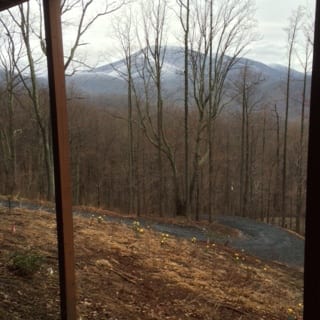Rate my weather day:
**** Thursday, March 17: Scattered Clouds, warm, chilly at night then hazy (and smelly) from the forest fire in the Shenandoah Valley. (Morning class at WriterHouse in Charlottesville was terrific, and our St. Patrick’s Day corned beef meal was, too, so let’s bump that up to ****½. Can’t do a ***** because of the forest fire.)
****½ Friday, March 18: Sunny and warm, cool overnight and not much smoke. (In the afternoon, I met a friend at Basic Necessities so let’s call it a *****.)
 * Saturday, March 20: Rain, fog and snow at higher elevations, cold, isn’t it supposed to be spring? (In the morning, I quilted with the women at church ***** and my husband took me out for a romantic dinner at Zynodoa ***** and a show at the American Shakespeare Center in Staunton *****. So let’s see, 1 star + 5 stars + 5 stars + 5 stars = 16 stars divided by 4 ratings = *****. Yes, I know the math is wrong, but it was a lovely dinner and a really fun show!)
* Saturday, March 20: Rain, fog and snow at higher elevations, cold, isn’t it supposed to be spring? (In the morning, I quilted with the women at church ***** and my husband took me out for a romantic dinner at Zynodoa ***** and a show at the American Shakespeare Center in Staunton *****. So let’s see, 1 star + 5 stars + 5 stars + 5 stars = 16 stars divided by 4 ratings = *****. Yes, I know the math is wrong, but it was a lovely dinner and a really fun show!)
Well, you get the idea. My ratings change according to factors unrelated to weather. Trust me, a fender-bender could doom a “great” weather day. And I suspect Amazon raters are similarly biased and cranky.
Take for instance Anthony Doerr’s 2015 Pulitzer Prize winning novel All the Light We Cannot See: 4.6 out of 5 stars and 22,075 reviews last time I checked. “Best Book Ever!!” customer Li Jin wrote. “Modern masterpiece,” said Debbi B, and BookAHolique chimed in, “Absolutely Beautiful!” Then there were the less enthusiastic. “Not for me,” said Carina Johnson, “It felt like reading a cookbook.” Ouch! “Cannot See the Point,” MiniRN agreed, and so did “Dissapointed” [sic] Carl. “Doerr is a real master of beautiful prose but many of his details are off,” wrote Alexandra Grabbe, who noted small details, “mistakes” about 1940 Paris and again in the 60s – there was no air conditioning in Paris. One Star.
**** My review, if I had posted it: I loved Doerr’s book, the story, structure, characters, pacing, settings, and style. But the end did not quite satisfy. Not that I need closure or a happy ending, but I like to finish reading a book and sigh like I do after eating a good meal or seeing a great show.
Is there a place for professional book reviewers to guide readers in the Age of Amazon? That’s one of the questions Nathan Heller ponders in his New Yorker article, “Says You,” a review A. O. Scott’s book Better Living Through Criticism. (Yeah, ironic to be writing about a review of a book about reviewing.) The title alone gave away the plot. (One Star?) Yes, Scott proclaims, critics are still necessary. “Criticism is art; art is criticism,” Heller chimed in.
Beyond the Times, The New Yorker, The New York Review of Books and so forth, critics usually gain attention by being so called First Responders, sniffing out new talent, Scholars, who “know the canon backward and forward,” or Seducers who woo us with words and show us a good time. We pay attention to critics’ opinions – until we don’t.
“What criticism shares with art, in other words, is a particular kind of magic: an exchange through which we transfer our attention and our trust to a different imagination, hoping that, by some transfiguration on the page, another person may begin to speak our minds. It’s not something we do for Amazonians or Yelpers, whom we trust only in numbers.”
Do I trust my numerical weather day ratings? Not one bit. But I admit to reading reviews, except for a person who writes something like, “Not grate.”
How do you decide what to read?



Critics have many uses. For some they determine taste and set fashion, tell them what to think. To be “IN” one must know what these critics say and agree with them … whether you do or not.
I have two favorite types of critics: 1. those I always agree with because we share the same tastes, therefore I will take their advice; 2. those I never agree with because they are probably lacking in (my) taste, therefore I must avoid what they like and try what they dislike.
Thank you for your comment, which offers good points about the role of critics and who we choose to believe.